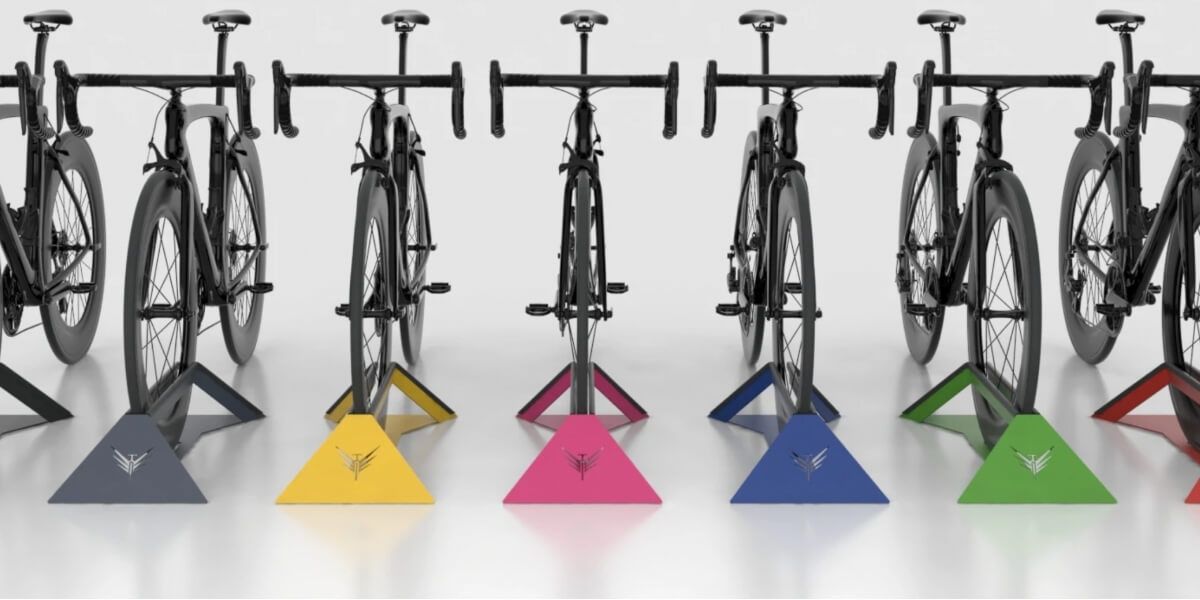Three companies which support sustainable commutes
First off, let’s address the elephant in the room: a parking company talking about sustainable commutes. Parkable’s parking management software makes parking at work easier and less stressful - but that doesn’t mean we think everyone should drive to work. In fact, we believe parking should be available at work when it’s really needed (for example, when you have to drop kids at school and then rush to a big presentation) - not all the time.
That means employers sharing their parks between the people who need them, rather than giving employees a dedicated parking spot every day - which encourages driving every day. By making workplace parking a shared resource, we can encourage people to use greener modes of transport the rest of the time, like cycling and public transport, as well as innovative solutions like carpooling apps. Now, let’s dig into the issue of commuting.
Why you should care about sustainable commuting
While transportation is one of the leading contributors to greenhouse gas emissions, companies trying to reduce their carbon footprint often overlook how their employees get to work, likely because commuting takes place outside of business hours.
However, every litre of petrol and diesel used releases approximately 2.4kg of CO2 into the atmosphere, and transport produces 27% of emissions in the UK, 17% in Australia, and 21% in New Zealand. If you can shift your employees away from private vehicles, and toward public transport or active commutes, you’ll make a big impact.
As a bonus, the move to eco-friendly modes of travel can contribute to happier and healthier individuals, stronger retention rates, and higher productivity within the workplace.
We spoke to bicycle storage solutions company Velohawk and carpooling software company Hitch about how platforms and facilities can help workplaces to promote more sustainable commuting habits.
Velohawk: Bicycle storage solutions for your workplace
Since the Covid-19 outbreak, there has been a significant increase in bicycle sales. The upsurge in solo exercise during lockdown, and heightened anxiety about social distancing on public transport, has led to the so-called “bike boom”.
Cities around the world are following this consumer trend with policy changes. Paris is investing over €150m in bike lanes in an effort to become the world’s cycling capital. Similarly, London has added more than 260km of cycle routes to the city’s infrastructure since 2016.
One challenge, however, is security. As cycling has increased in popularity so, sadly, has bike theft. Cycling Weekly UK reported that 1,100 bikes are stolen every day in the United Kingdom, while in New Zealand police are warning riders to be ‘extra vigilant’ when securing their bikes due to a wave of theft.
While many people want to switch to a bicycle commute to work, concerns with security can reduce uptake and make people reluctant to bring their bike to work.
This is where Velohawk comes in.
Velohawk offers a wide range of end-of-ride facilities fit for any space. The idea was developed to respond to the need for secure and premium bike storage for commuters, and was built with both homes and workplaces in mind.
James Doughty, Velohawk’s founder and an avid cyclist, told us that he and partner Emily Camblin want to eliminate the barriers that inhibit commuters cycling to work. Whether it’s anxiety about security, the real issue of bike theft, or not wanting to risk damage by propping bikes against a galvanised piece of metal, Velohawk was designed to solve the problem.

“Bike racking can be quite basic and abrasive, frustrating cyclists who want to arrive at their place of work, lock up their bike and know it will be safe while they are away and undamaged when they return. It’s a simple and understandable desire, but by fulfilling it we are making it easier for people to transition to cycle commuting and using bikes instead of cars.”
— James Doughty
Velohawk bike storage products are designed for buildings and developments wanting to offer their employees and customers safer and more stylish alternatives. From the architecturally designed bike racks, with secure locking stands, to the fully enclosed bike storage pods, their products appeal to individuals and businesses alike. Each is made with robust construction and tested materials, with pods also including RFID opening and alarm systems.
There are a variety of Velohawk products to fit the needs of your employees and workplace. They offer flexible solutions, whether you are looking to elevate your new build with functional storage or to fully utilise previous redundant space.
People look for opportunities to engage in incidental exercise and combining this with the daily commute makes sense to many people. By supporting employees with safe and secure bicycle storage, companies can overcome one of the most common barriers to an active and sustainable commute.
As well as the environmental benefits, enabling more active commutes benefits employees and businesses. Organisational psychology research has shown that workplace health promotion programmes contribute to reduced stress, lower sickness absence, stronger retention rates, and happier and more productive employees.
Hitch: Innovative carpooling technology
For employees that have limited access to public transport or live too far away for an active commute, carpooling is the ideal sustainable solution.
Co-workers who live close to each other or travel on the same route can easily carpool to the office. This reduces the number of cars on the road, which in turn reduces fossil fuel emissions. It’s also convenient, inexpensive, and creates opportunities for socialising and culture building, making it a great initiative for businesses to get behind.
One challenge that businesses have had in the past is the vast administration efforts needed to create their own carpooling networks and processes. Luckily, the development of carpooling technology has made it easy and efficient to integrate carpooling into the workplace. Businesses now have the opportunity to create exclusive networks for their employees, making the carpool experience more convenient, safe and less daunting.
There are a few carpooling platforms to choose from, depending on where you’re based. Liftshare in the UK and CarpoolWorld in Australia are two popular platforms that help businesses to build their own private carpooling networks.
We spoke to New Zealand company Hitch to get the inside scoop on how carpooling software works for businesses.

Hitch, like many car pooling platforms, takes the administrative burden out of the equation for businesses. Their digital platform sets up carpooling networks by matching employees from the same or neighbouring organisations who are travelling in the same direction at the same time.
Dashboards are set up for the workplaces to receive metrics on carpooling behaviours, user satisfaction, and most importantly the carbon emissions saved. Hitch also removes any awkward conversations around petrol payments by splitting the petrol costs through their platform.
Claudia Grave, the co-founder of Hitch, spoke about the benefits of the social side of carpooling; “We’ve had some great customer stories. One carpool involved two People Managers from different neighbouring companies. They were both working through approaches to the vaccine mandates at the time and were able to exchange stories and bounce ideas!”
Businesses also find it a great way to engage their employees:
“Hitch was a great way to engage our workforce in the sustainability journey. It sparked positive conversations across the office and influenced more sustainable employee behaviour.”
- Sarah Williams, Innovation and Improvement Lead, Simply Energy
To get the ball rolling on carpooling, you can make use of not only carpooling technology, but also incentives that reward those who adopt a carpooling commute. We suggest assigning a number of your staff parking spots as ‘carpooling only’. If your staff pay for parking at work, you could make carpooling spots cheaper than the regular daily rate to further incentivise carpooling.

Quantifying your commuting footprint
For many companies, the first step toward greener commutes is finding out how employees get to the office. However, it’s difficult to measure a company’s commuting profile and emissions, and then track these over time.
That is why Hitch also offers a commuter analysis tool, which measures and reports on businesses commuting emissions over time. Ranging from basic data collection and reporting, through to comprehensive interviews, workshops and engagement tools, it’s a great tool for organisations of all sizes.
“The Hitch team … are paving the way for others to achieve outcomes to better our environment and our communities. We are excited to continue to work with Hitch to improve our impact.”
- Jasmine Wilkstrom, the Co-Operative Bank
Hitch has recently had their methodology endorsed by Ekos, who work with companies to measure and verify carbon footprints, create carbon reduction plans, and certify the results.
Parkable: Improve the use of your staff parking and manage EV chargers
So, how can a parking company help? It does seem counterintuitive, but there are a number of areas where parking technology can add to a greener transport plan.
For those who are driving into work, Parkable makes the drive as quick as possible by directing people to a reserved parking spot. A whopping 30-40% of urban congestion is caused by drivers searching for a place to park, which is a problem caused by the lack of visibility of which parking is available. In fact, a single person can eliminate 227kg of greenhouse gases every year simply by ending the search for a park.
With the Parkable app, employees can book a parking spot when they need one, and then drive straight into their assigned spot for the day. Staff can also view car park availability, both in real time and for the upcoming week. If there isn’t a park available, employees know this in advance and can organise alternative transport, rather than driving into the office blindly and then circling for a park nearby.
Plus, parking spots that are allocated to specific employees can easily be shared amongst your team, so more people can drive directly into the office rather than leaving space sitting empty.
Parkable can also be used to incentivise carpooling, by putting different prices on ‘one person’ and ‘carpooling only’ parks. If you have EV chargers available for staff or visitors, you can use Parkable’s EV charger management software to manage, share, and monetise them.
If you’re excited by these ideas, please reach out to Velohawk, Hitch or Parkable! We’d be happy to talk to you about making your workplace’s commuting more sustainable.
Suggested articles
Solve your parking problems
If you have workplace parking spots and want to...
- Improve employee parking experiences
- Reduce car park admin
- Make better use of your space
- Align your parking with a flexible working culture
- Implement hardware solutions
...feel free to get in touch!
 Blog
Blog